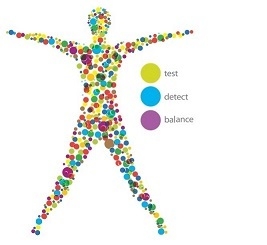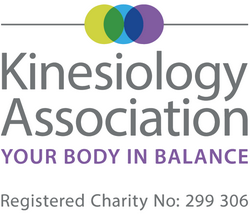What is Kinesiology?
What is Systematic Kinesiology?
Systematic Kinesiology is a natural healthcare system which uses manual muscle response testing to evaluate many functions within the body.
Kinesiology was developed by Dr. George Goodheart, a US Chiropractor, in 1964.
What is muscle testing?
Muscle testing is the ability to hold the muscle against light pressure. This process enable analysis of minor functional imbalances, which when not corrected can cause compensations and more serious health issues.
Each muscle is related to an organ or gland, and also to an energy pathway called a meridian.
Kinesiology was introduced into the UK in 1984 and we use the terminology Systematic Kinesiology
Finding imbalances
Together the muscle, organ /gland and meridian form a "circuit". Any bio-chemical, emotional, structural or electro-magnetic stressors affecting the circuit can be identified when a muscle tests weak or "spongy".
Once an imbalance has been found, the kinesiologist uses further muscle tests to see what factors are aggravating the imbalance, and what will help to rebalance it.
Discovering what's involved and what will help
Each time a relevant factor is introduced, the muscle response will change, a bit like a switch.
For example, if a muscle is spongy (or "switched off"), and then the person suddenly thinks of a specific emotional stress and the muscle then tests strong again, (i.e. "switches on"), this indicates that this specific emotion is linked to the imbalance. The same method is applied for bio-chemical, structural and electro-magnetic problems. There is no guess work with Systematic Kinesiology.
Based on this feedback, the kinesiologist and the client can investigate together which factors are relevant to the imbalance, and a bespoke treatment package is created. This may include nutritional supplements, techniques for emotional stress release, Bach flower remedies, acupressure, gentle structural realignment, chakra balancing, massage of reflex points, as well as lifestyle changes. The treatment you receive depends on the feedback your body gives through the muscle test and about what it needs to return to health.
Enjoy improved health
Systematic Kinesiology practitioners are dedicated to prevention as well as to relieving the condition. They are able to help clients more effectively if the person is committed to improving their health through self-help and changes to their health regime. Taking control of your life and enjoying improved health and well-being is something that we can all do.

This usually depends on your complaint and how fully you participate in your own treatment including making the suggested lifestyle and dietary changes that often form part of your "homework". Usually, however, most people feel an improvement in 2 to 4 visits. It is then recommended that you have routine balances 2 or 3 times per year for maintenance.
For children under 5 and for those with limited mobility we normally use a surrogate. This may be a family member or friend, and the surrogate may need to be balanced first.
Next Previous Testimonials
Candida and emotional issues
I am so thankful that I found Isabelle Cooke as I had been suffering with leaky gut, candida and emotional issues. At my first session I felt so uplifted and confident and immediately began to realise that I was holding on to things that were keeping me from being well. I had been to other similar professionals but Isabelle is an amazing kinesiologist who has changed my life. I don’t know what I would have done without her. Thank you Isabelle”. JH – London
Rebalance an overly stressed body
Isabelle is fantastic. She has looked after me so well, and helped rebalance an overly stressed body. Treatment with her is thorough and calming. MB – London
Better than before
I have been seeing Isabelle for Kinesiology for a few months now and I am feeling much better than before! After allowing things to get on top of me for most of 2016, I realised that I needed to take action before things spiralled out of control. Isabelle is a great therapist and I felt at ease with her immediately. Kinesiology is a fantastic all around therapy as it is so specific to the individual that is being tested. The human body is amazing and so intricate and I think that kinesiology is just the right therapy to work with the body and allow natural healing to take place. Through muscle testing, your particular issues (nutritional, emotional, structural etc) can be revealed and then take the appropriate action can be taken. Techniques such as ESR are very powerful and you can often get immediate relief from some symptoms right there in the session. I always walk out of my sessions feeling as light as a feather. I can highly recommend Isabelle for Kinesiology and I will definitely be returning RP – London
Kinesiology is unlike other therapies
I had been suffering severely from depression for over 10 years, unaware for much of this time how unwell I was or what exactly was wrong. I had tried many different therapies which had helped to a certain extent, but had not made a massive impact. It was not until I started to have Systematic Kinesiology with Isabelle, that I really noticed things were shifting. Systematic Kinesiology is unlike other therapies, and it is not always easy to understand how it works, however the effects have been dramatic and I am beginning to get my life back, which I attribute mainly to these sessions with Isabelle. Kinesiology can help with a wide variety of complaints, and this is evident in the fact that it has also got rid of my stiff back. Overall, my energy levels are higher than ever, my diet has improved, and I have now regained my enthusiasm for life. Whatever it is you need help with, I would highly recommend trying Systematic Kinesiology with Isabelle. VT – Essex
Natural remedies for conditions
Kinesiology? what’s that? My first response when Isabelle told about her work; having been treated by her over the last four months, I cannot recommend it highly enough; natural remedies for conditions that I had thought untreatable, sleeping so much better, weight loss, and general improvement in mood, FANTASTIC! JM – Essex
A true, caring professional
I found Isabelle to be a true, caring professional. I was putting on weight without over eating, tired and not absorbing information properly. A thyroid imbalance was discovered. After a few days of taking kelp, I have much more energy,hair is shining and i feel like i am no longer accumulating weight. My 9 year old son had a kinesiology balance too. He had developed a phobia of going into the underground to travel. Three days after his kinesiology balance, we travelled to Hyde Park. From the hysterical fear of the tube trip the Sunday before, he was quite surprised to be totally free of phobia. Kinesiology – way forward. JS – London
A difference to my stress levels
It has been 3 days now since my kinesiology treatment with Isabelle and I have to say I am feeling so, so much better. The supplements and remedies recommended have really made a difference to my stress levels in such a short time. I really feel like I can cope with the situations that have been bothering me. Thank you Isabelle x AW – Essex
Remarkably better for it
I had my third Kinesiology treatment with Isabelle today and feel remarkably better for it. I am more calm, restored and the discomfort in my lower back has eased a lot. Can highly recommend My Balanced Health and am looking forward to my next session. CF – Essex
Would highly recommend her services whatever the ailment
I had a Kinesiology treatment with Isabelle yesterday. What an amazing woman! Extensively knowledgeable in a host of areas, she gave me great confidence in her ability to ‘sort me out’. I left feeling that a great weight had been lifted from my shoulders – literally. I will definitely be seeing her again and would highly recommend her services whatever the ailment. JH – Essex
I feel more relaxed and energized
“I originally sought help through Kinesiology for a muscular back problem, but later realised that it can help with so many other things, such as anxiety and stress. I’d never even heard of Kinesiology, but Isabelle explained it really well, which made me want to find out more. After having a few treatments I feel more relaxed and energized, which in turn has helped my back problem. I generally feel more balanced you might say. Isabelle’s friendly and welcoming approach makes Kinesiology something that is definitely worth giving a try!” WW – Essex
Release Upper Body Tension
Your space felt blissful and welcoming, as did you! I don't recall a time where I've felt that I could be authentic and open in the way that I was on Sunday. Thank you for providing that space. One of the outcomes I hoped for was to release my upper body tension and I'm pleased to say, I've been feeling lighter and looser! The blockage I described in my throat chakra seems to have dissipated too - I mentioned that I was reacting my son at times and that I was finding it hard to keep my cool. This happens quite often and I've already registered a difference in my physical response to him. I don't feel that immediate blockage in my throat and I seem to be able to find my words with ease and in a calm way too. All of what I experienced on the day was more than I could have expected. NR - West Midlands
I feel absolutely Amazing
I feel absolutely amazing and great after the session the work you do is fantastic. I'm feeling a lot lighter and happier. My son commented yesterday at how I seem happier and not so grumpy ha ha always rely on kids for honesty. But I do feel happier and I definitely feel that since working with you things are getting to a good place for me mentally and physically. BS - West Midlands
Children engage with Kinesiology!
We really enjoyed our sessions with Isabelle and I could see my children really engaged with the session and understood but also really got it! Which was so good to see. Isabelle is really good explaining what she’s doing and what things mean as they come up, I love the information and understanding that goes with it, I find it so fascinating and amazing that our bodies can tell us what they need or don’t need to function in balanced health. I highly recommend sessions with Isabelle if you are looking to take control of your health to live in harmony with your body and to feel the best version of you. MK - London
My sex life has been transformed!
My sex life has been transformed since my kinesiology sessions with you. I have gone from a very low libido to wanting sex again & to my husband's delight we are now enjoying having more sex and regaining our intimacy in our relationship. Thanks for all the information you are able to share with me during my sessions and all the advice you give to me to help me gain #bestlife. BA - West Midlands
Support for Enlarged Prostrate
Kinesiology, a holistic approach that focuses on the relationship between a person's physical movements and their overall well-being, played a transformative role in addressing my peeing disorder and enhancing my quality of life. The integration of muscle monitoring techniques, body awareness, and energy balancing in kinesiology helped me identify and address the root causes of my condition. Through kinesiology sessions, I learned how certain muscle imbalances and energy blocks were contributing to my peeing disorder. By working with a skilled kinesiologist, I was able to pinpoint specific areas of tension and weakness in my body that were affecting my urinary system. Through gentle manual muscle testing and subtle energy adjustments, we were able to rebalance my body and promote optimal functioning of my urinary system. As a result of undergoing kinesiology sessions, I experienced a significant improvement in my peeing disorder. I noticed a marked reduction in urinary frequency and urgency, allowing me to regain control over my bladder function. This newfound sense of control and confidence had a positive impact on my overall well-being, leading to a greater sense of calm and relaxation. Moreover, the benefits of kinesiology extended beyond just addressing my peeing disorder. I found that I had increased energy levels and improved physical vitality as a result of the sessions. By releasing tension and restoring balance in my body, kinesiology helped me tap into my body's natural healing abilities and unlock a new level of energy and vitality that I had been missing. Additionally, I noticed a significant improvement in my mood and emotional well-being after incorporating kinesiology into my wellness routine. The holistic nature of kinesiology enabled me to address not only the physical aspects of my condition but also the emotional and energetic components underlying it. By promoting harmony and balance in both body and mind, kinesiology helped me find a renewed sense of joy, positivity, and overall emotional well-being. In conclusion, kinesiology has been a powerful tool in transforming my health and well-being. By addressing the interconnectedness of body, mind, and spirit, kinesiology helped me overcome my peeing disorder, boost my energy levels, and enhance my mood. I am grateful for the profound impact that kinesiology has had on my life and look forward to continued growth and healing through this holistic practice. AMC-West Midlands




